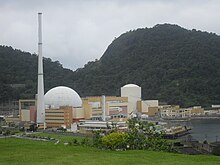Angra Nuclear Power Plant
| Angra Nuclear Power Plant | |
|---|---|

Angra Nuclear Power Plant
|
|
| Country | Brazil |
| Coordinates | 23°00′30″S 44°27′26″W / 23.00833°S 44.45722°WCoordinates: 23°00′30″S 44°27′26″W / 23.00833°S 44.45722°W |
| Construction began | 1971 |
| Commission date | January 1, 1985 |
| Operator(s) | Eletrobrás Termonuclear S.A. - Eletronuclear |
| Nuclear power station | |
| Cooling source | South Atlantic Ocean |
| Cooling towers | no |
| Power generation | |
| Units operational | 1 x 637 MW 1 x 1,350 MW |
| Units under const. | 1 x 1,405 MW |
| Average generation | 12,983 GWh |
|
Website eletronuclear.gov.br |
|
Angra Nuclear Power Plant is one of Brazil's few nuclear power plants. It is located at the Central Nuclear Almirante Álvaro Alberto (CNAAA) on the Itaorna Beach in Angra dos Reis, Rio de Janeiro, Brazil. It consists of two Pressurized water reactors, Angra I, with a net output of 637 MWe, first connected to the power grid in 1985 and Angra II, with a net output of 1,350 MWe, connected in 2000. Work on a third reactor, Angra III, with a projected output of 1,405 MWe, began in 1984 but was halted in 1986. Work started again on 1 June 2010 for entry into service in 2015 and later delayed to 2018.
The Central Nuclear Almirante Álvaro Alberto complex is administrated by Eletronuclear, a state company with the monopoly in nuclear power generation in Brazil. The complex employs some 3,000 people and generates another 10,000 indirect jobs in Rio de Janeiro state.
Angra I was purchased from Westinghouse of the USA (its sister power plant is Krško Nuclear Power Plant in Slovenia). The balance of plant design was subcontracted to Gibbs and Hill (USA) in association with PROMON Engenharia S.A. and construction to Brasileira de Engenharia S.A.
The purchase did not include the transfer of sensitive reactor technology. As a result, Angra II was built with German technology, as part of a comprehensive nuclear agreement between Brazil and West Germany signed by President Ernesto Geisel in 1975. The complex was designed to have three PWR units with a total output of around 3,000 MWe and was to be the first of 4 nuclear plants that would be built up to 1990.
The development of Angra III began in 1984 as a Siemens/KWU pressurized water reactor but was halted in 1986. About 70% of the plant's equipment was purchased in 1985 but has been in storage ever since. In June 2007, restarting of construction was approved by the National Council for Energy Policy. President approved the construction in July 2007. In December 2008, Eletronuclear signed an industrial cooperation agreement with Areva. On 31 May 2010, the National Nuclear Energy Commission granted a licence for construction of the third reactor. Construction of the reactor with capacity of 1,405 MWe begun on 1 June 2010 and it should be operational by 2018.
...
Wikipedia

